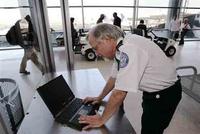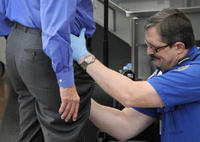-
Facebook could mean the end of undercover ops
Law enforcement officials have begun using Facebook to identify criminals and gather information about their habits, but the technology has the potential to be a double edged sword; an undercover officer could successfully infiltrate a gang only to have their cover blown after their photo is recognized and their Facebook profile carefully scrutinized
-
-
Judge dismisses parts of lawsuit filed by partially naked man at airport
On Tuesday a federal judge dismissed most of the constitutional claims of a lawsuit filed by a man who was arrested at an airport after he stripped at a security checkpoint in protest of enhanced screening measures
-
-
Expert warns facial biometrics could compromise privacy
As facial biometric technology becomes increasingly ubiquitous, IT experts warn that these systems can easily be abused and therefore require stringent privacy policies and data encryption
-
-
DHS's new terrorist database rankles privacy groups

A new DHS plan to create its own version of the FBI’s terrorist watch list that is exempt from the Privacy Act has privacy groups concerned; under the proposed plan, DHS would create the Watchlist Service which would bring the FBI’s suspected terrorist list in-house and expand on it
-
-
China's big surveillance push
In China’s latest push to keep tabs on its citizens, police in Beijing have ordered supermarkets and shopping malls throughout the city to install high-definition security cameras; the recent order comes as part of a broader expansion in monitoring technology which includes the addition of millions of surveillance cameras over the past five years and large increases in domestic security spending
-
-
Identifying Canadians from their date of birth, postal code
Researchers find that 97 percent of Canadians can be uniquely identified from their date of birth and postal code; this means that if these to items of information, plus gender, exist in any database, even if it has no names or other identifying information, it would be possible to determine the identity of those individuals birth
-
-
Face recognition software may reveal one’s social security number
Researchers demonstrate ability to predict social security numbers from people’s faces; “When we share tagged photos of ourselves online, it becomes possible for others to link our face to our names in situations where we would normally expect anonymity,” one of the researchers said
-
-
China further limits Internet access
In its continuing efforts to control the Internet, Chinese officials are now mandating that all cafes, hotels, and businesses in central Beijing install surveillance technology for Wi-Fi users; the new software would allow government officials to check the identities of users and monitor their activity at public computers; those who do not cooperate will face fines or even closure
-
-
Law enforcement and privacy concerns in Vancouver
Last month, the police in the otherwise sedate Vancouver had to use tear gas, pepper spray, and flash bombs in downtown Vancouver to try to disperse angry rioters who set cars on fire, looted stores, and taunted police officers after the Canucks’ 4-0 Stanley Cup final loss to the Boston Bruins; the police wants to use facial recognition technology to identify the rioters, but privacy advocates are worried
-
-
Law enforcement and privacy concerns in Massachusetts
Massachusetts has a plan: create a database which could map drivers’ whereabouts with police cruiser-mounted scanners that capture thousands of license plates per hour — and store that information indefinitely so local police, state police, federal agencies, and prosecutors could access it as they choose; privacy advocates are worried
-
-
Can DHS seize -- and hold for months -- U.S. citizens' laptops?

On Friday, a federal judge heard arguments in a lawsuit that challenged the government’s right to search laptops, cell phones, and other electronic devices at the border and hold them indefinitely; civil liberties groups say the policy violates a travelers’ First Amendment right to free speech and the Fourth Amendment’s protection from unreasonable search and seizure; according to the civil liberties groups, more than 6,500 travelers have been subject to such search and seizure of their electronic devices from October 2008 to June 2010
-
-
Data breaches compromise nearly 8 million medical records
The revelation that millions of people have had their personal medical records stolen could slow the Obama administration’s efforts to digitize the nation’s health care records; in the last two years alone nearly eight million people have had their medical records stolen or compromised; 1.7 million patients, staff members, contractors, and suppliers at several New York hospitals had their information stolen when thieves removed them from an unlocked van; to ensure that medical records are safe, HHS has begun imposing penalties on health care providers who compromise their patient’s records; but some health care experts wonder if enforcing HIPAA alone will be enough to address the problem
-
-
Study urges DHS to stop seizing laptops at border
A recent report called on DHS to stop its border agents from searching electronic devices like laptops and smartphones of individuals entering the United States without reasonable suspicion of wrong doing; the study, released last week by the bipartisan legal think tank The Constitution Project, argued that computers and cell phones contain far too much personal information and searching these devices without probable cause violates privacy considerations; border patrol agents have routinely conducted searches of individuals and their belongings entering the country, it is only recently become a potential legal issue due to the vast amount of personal data that electronic devices can now hold
-
-
Texas House prohibits intrusive airport pat downs

The Texas House of Representatives approved a bill that would make invasive pat downs at airports a crime; pat down procedures that would be covered under the measure are inspections that touch the anus, sexual organ, buttocks, or breast of another person including through the clothing, or touches the other person in a manner that would be offensive to a reasonable person; the law would not be enforceable since state legislatures have no authority over federal agencies such as the TSA
-
-
25 million more users hit in second cyber attack on Sony

Japanese electronics giant Sony recently announced that hackers successfully broke into its networks and stole sensitive data from more than twenty-five million online gaming subscribers; the announcement comes days after Sony’s admission that seventy-seven million users had their personal information stolen; in the most recent attack, hackers infiltrated Sony’s Online Entertainment network and stole names, addresses, emails, birth dates, and even phone numbers from online gamers; some analysts estimate that the attacks could cost Sony and credit card companies as much as $1 to $2 billion
-
- All
- Regional
- Water
- Biometrics
- Borders/Immig
- Business
- Cybersecurity
- Detection
- Disasters
- Government
- Infrastructure
- International
- Public health
- Public Safety
- Communication interoperabillity
- Emergency services
- Emergency medical services
- Fire
- First response
- IEDs
- Law Enforcement
- Law Enforcement Technology
- Military technology
- Nonlethal weapons
- Nuclear weapons
- Personal protection equipment
- Police
- Notification /alert systems
- Situational awareness
- Weapons systems
- Sci-Tech
- Sector Reports
- Surveillance
- Transportation
Advertising & Marketing: advertise@newswirepubs.com
Editorial: editor@newswirepubs.com
General: info@newswirepubs.com
2010-2011 © News Wire Publications, LLC News Wire Publications, LLC
220 Old Country Road | Suite 200 | Mineola | New York | 11501
Permissions and Policies
Editorial: editor@newswirepubs.com
General: info@newswirepubs.com
2010-2011 © News Wire Publications, LLC News Wire Publications, LLC
220 Old Country Road | Suite 200 | Mineola | New York | 11501
Permissions and Policies
